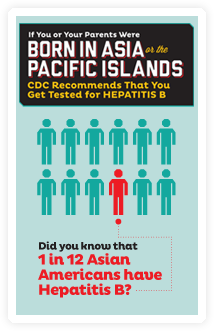1 in 12 Asian Americans and Pacific Islanders has Hepatitis B
Hepatitis B is common worldwide, especially in many parts of Asia and the Pacific Islands. In the US, Hepatitis B disproportionately affects Asian Americans and Pacific Islanders (AAPIs). While AAPIs make up less than 5% of the U.S. population, they account for more than 50% of Americans living with Hepatitis B.
Hepatitis B is serious, but treatments are available
Left untreated, nearly 1 in 4 people living with hepatitis B develop serious liver problems, even liver cancer. In fact, Hepatitis B-related liver cancer is a leading cause of cancer deaths among Asian Americans. Getting tested for Hepatitis B can help many people access lifesaving treatments that can prevent serious liver damage.
2 in 3 Asian Americans with Hepatitis B don't know they are infected
People can live with Hepatitis B for decades without having any symptoms or feeling sick. Hepatitis B is usually spread when someone comes into contact with blood from someone who has the virus, and many people living with Hepatitis B got infected as infants or young children. Testing is the only way to know if someone has Hepatitis B.
Who should get tested for Hepatitis B?
- Anyone born in Asia or the Pacific Islands (except New Zealand and Australia)
- Anyone born in the United States, who was not vaccinated at birth, and has at least one parent born in East or Southeast Asia (except Japan) or the Pacific Islands (except New Zealand and Australia)
Hepatitis B testing identifies people living with Hepatitis B so they can get medical care to help prevent serious liver damage. Talk to a doctor about getting tested for Hepatitis B.
- Page last reviewed: July 11, 2013
- Page last updated: September 29, 2014
- Content source:





 ShareCompartir
ShareCompartir
